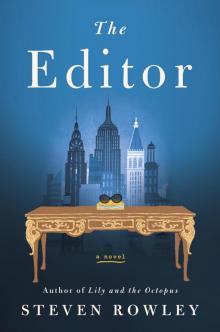- Home
- Steven Rowley
The Guncle
The Guncle Read online
ALSO BY STEVEN ROWLEY
The Editor
Lily and the Octopus
G. P. Putnam’s Sons
Publishers Since 1838
An imprint of Penguin Random House LLC
penguinrandomhouse.com
Copyright © 2021 by Ten Wry Wolves, Inc.
Penguin supports copyright. Copyright fuels creativity, encourages diverse voices, promotes free speech, and creates a vibrant culture. Thank you for buying an authorized edition of this book and for complying with copyright laws by not reproducing, scanning, or distributing any part of it in any form without permission. You are supporting writers and allowing Penguin to continue to publish books for every reader.
Library of Congress Cataloging-in-Publication Data
Names: Rowley, Steven, author.
Title: The guncle : a novel / Steven Rowley.
Description: New York : G. P. Putnam’s Sons, [2021]
Identifiers: LCCN 2020049239 (print) | LCCN 2020049240 (ebook) | ISBN 9780525542285 (hardcover) | ISBN 9780525542292 (ebook)
Classification: LCC PS3618.O888 G86 2021 (print) | LCC PS3618.O888 (ebook) | DDC 813/.6--dc23
LC record available at https://lccn.loc.gov/2020049239
LC ebook record available at https://lccn.loc.gov/2020049240
Interior art: Palm tree pattern © Rvector/Shutterstock
Cover design and art: Tal Goretsky
Book design by Kristin del Rosario, adapted for ebook by Maggie Hunt
This is a work of fiction. Names, characters, places, and incidents either are the product of the author’s imagination or are used fictitiously, and any resemblance to actual persons, living or dead, businesses, companies, events, or locales is entirely coincidental.
pid_prh_5.7.0_c0_r0
For Evelyn, Harper, Emmett, Elias, and Graham
Contents
Cover
Also by Steven Rowley
Title Page
Copyright
Dedication
Epigraph
Prologue
Six Weeks Earlier
Chapter One
Chapter Two
Chapter Three
Chapter Four
Chapter Five
Chapter Six
Chapter Seven
Chapter Eight
Chapter Nine
Chapter Ten
Chapter Eleven
Chapter Twelve
Chapter Thirteen
Chapter Fourteen
Chapter Fifteen
Chapter Sixteen
Chapter Seventeen
Chapter Eighteen
Chapter Nineteen
Chapter Twenty
Chapter Twenty-One
Chapter Twenty-Two
Chapter Twenty-Three
Chapter Twenty-Four
Chapter Twenty-Five
Chapter Twenty-Six
Chapter Twenty-Seven
Chapter Twenty-Eight
Chapter Twenty-Nine
Chapter Thirty
Chapter Thirty-One
Acknowledgments
About the Author
“Never love anyone who treats you like you’re ordinary.”
—OSCAR WILDE
“You said, oh girl, it’s a cold world when you keep it all to yourself.”
—PAT BENATAR, “SHADOWS OF THE NIGHT”
All right, here goes nothing.
Patrick held his phone in landscape mode and waited for the autofocus to find Maisie and Grant. The children looked slight, smushed together as they were, even Maisie, who was already nine. If the camera added ten pounds (and Patrick had spent enough time in front of cameras to know the old cliché to be true), then his was irreparably defective. Maisie brushed her hair out of her face; six weeks with him in Palm Springs and it was already lighter from the desert sun. Grant mindlessly tongued the space where his tooth used to be.
“Sit up,” Patrick encouraged, but it wasn’t their posture so much as their fragility that made his niece and nephew appear small, both of them a bundle of raw nerves eager to be exposed. He smiled as the camera brought them sharply into view. As an exercise, what was the point of the summer if not helping them come into focus? Patrick hovered his finger over his phone before calmly hitting record. “Tell me something about your mother.”
Maisie and Grant turned inward, each willing the other to speak. Patrick had never witnessed such a case of debilitating stage fright in his entire career. The two children negotiated in silence, almost telepathically, the way close siblings sometimes can, and eventually Maisie, the oldest by three years, spoke first. “She was tall.”
Patrick looked out from behind his phone. “She was tall? That’s it? Giraffes are tall. Your mother’s a giraffe?”
“NO!” They were both offended by the suggestion.
“Don’t yell at me,” Patrick protested. “It’s up to you to lead with something better than her height.”
Grant took a swing. “She was strong. One time she lifted the thofa to vacuum under it.”
“CUT.” Patrick stopped recording. Of course he wanted Grant to think of his mother as strong—Sara’s treatment had robbed her of much of the resilience that defined her—and he was even willing to overlook his nephew’s lisp, even though they’d been working on it in the quiet of late afternoons, but he wasn’t about to let Sara suffer the indignity of sharing space in this video with a Dyson upright. “You kids are terrible at telling stories.”
Maisie grew agitated. “Well, what do you want us to say?”
“What do I . . . Being in a video was your idea!”
Grant kicked his little feet in frustration, stubbing his toes on the coffee table.
“Don’t scuff my furniture.” Patrick held his phone out to Maisie. “Here. Record me. I’ll show you how it’s done.” Maisie started to protest, but Patrick wouldn’t hear of it. “Tsk tsk tsk.”
Maisie reluctantly accepted her uncle’s phone and held it up to record him.
“Higher,” Patrick said.
“What?”
“Higher. Stand up.”
Maisie stood.
“Higher!” Patrick leaned forward and coaxed Maisie’s arms in the air. “Honestly, it’s like you want me to have four chins. Guncle Rule—What number are we on? Know your angles. Everyone has a good side. Even children, who should be photographable from all sides but aren’t.” He sat back in his midcentury leather club chair and motioned for Maisie to hold her camera position. “Never mind, we’re getting way off track here. See the red button? That’s record.”
Maisie was losing patience, and the attitude she displayed when pressed was bubbling to the surface. “Tell me something I don’t know.”
“Stockard Channing’s real name is Susan.”
Maisie lowered the camera, annoyed.
“Well, you didn’t know that, did you? And now you do.” Patrick coaxed Maisie’s arms higher to reclaim his angle. “Susan Stockard. Stockard was her last name.”
“Who’th Thtockard Channing?” Grant asked, tripping over the mouthful.
“Oh, good lord. Rizzo?” Patrick waited to see if that registered. “In the movie Grease?”
Grant shrugged. “We haven’t theen it.”
“What? You’ve never seen Grease? When I was your age I watched it like a hundred times. The way John Travolta swung his hips . . . ?” Blank stares. “It’s fine. Grease 2 has a more progressive message on gender. And frankly, if you want the best of Olivia Newton-John, we should probably start with Xanadu.”
“Everything
you say is nonsense words,” Maisie protested.
“Look, just because you find these to be erudite conversations, I’m simply stating facts. Now, do you want me to show you how to do this, or not? Please. Hit record.”
Maisie did as she was told, if only to speed things along. “Tell us about our mom.”
Patrick closed his eyes and conjured an image of Sara. When he opened them, he looked squarely into the camera’s lens. “Our friendship began in darkness. Your mom asked if I wanted to see the view from the roof of our college dorm and I did. We took the elevator to the ninth floor and then inched up a final, musty stairwell, the fire door slamming shut behind us. Your mom led. She was inclined to do that. I followed, huddled tightly to her as if we were a duo of teen detectives about to uncover some ghastly twist in our case. We were sweating, I remember that, even though it was the second week of October. I must have been bitching about it because your mother called me an ‘artful complainer.’ Now, that was a euphemism if I ever heard one. You guys know what a euphemism is?” Patrick looked to each of the kids; clearly they did not. “It’s a milder, indirect way of saying something that might be otherwise harsh or embarrassing.” He studied their expressions to see if it was sinking in. “You’re both looking at me like you’re a couple olives short of a martini. BOOM. Euphemism for not keeping up.”
Grant scrunched his face. “I don’t like oliveth.”
“It doesn’t matter. I’m teaching you two how to tell a story.” Patrick pointed at his ear to get them to listen. “So, the door below had locked shut and the one above wouldn’t open, and try as we might, there was no going up. Or down. We found ourselves stuck in that stairwell for hours with nothing to do but share skeletons. She asked if I was going to tell her my biggest secret, or if I was going to wait and do the whole gay-by-May thing. Your mother had my number, right from the start.”
“What’s gay by May?” Maisie was lost, but to her credit she held the camera position.
“It’s that thing where you wait to come out until sometime in your second semester.”
“How do you share a thkeleton?”
“Skeletons are embarrassing facts you want to keep to yourself.”
“No they’re not, they’re a person of boneth!” Grant was clearly ruffled.
“And they’re both very scary! You know, storytelling is building a rhythm; these constant interruptions are not helpful. ANYHOW. Turns out the door above us wasn’t locked, just stuck, and eventually we found ourselves on the roof, basking in the most extraordinary sunset. I had my camera with me, and I got off a few shots of your mom looking resplendent bathed in pink light. I told her she looked beautiful and she said, ‘You’d think differently if you saw me two noses ago.’”
“Mom had three nothes?”
“Grant! What did I say about interruptions?” Patrick cleared his throat. “That night on the roof she told me life was going to be easy, I remember that. I promised her the same, but she looked at me as if I were hopelessly naive. She said life was different for girls—harder. But she told me I was talented. That I might even be famous one day. I had that kind of head.”
“What kind of head do you have?” Maisie asked.
Sara meant large, but for the sake of the story Patrick said, “The kind with only one nose.”
“You are famouth!”
“Well, fame is measured on a sliding scale, but your mother was right about a lot of things.” Patrick’s eyes glazed, thinking how tragically wrong she was about others. “Eventually, campus police came and told us to move along. We’d tripped an alarm, if I recall.” Patrick paused; it might have been that joint they were smoking instead. “Our friendship began in darkness,” he repeated, remembering the stairwell. “But your mother? She was always my light.”
Maisie quietly pressed stop and lowered the phone to her side. There was indeed a right and a wrong way to tell a story, and her expression said she wanted to know everything that happened next.
“That was really good, GUP.”
Patrick leaned forward to reclaim his phone. He motioned for them to sit back together. “Now, let’s try this again.” He imagined himself Mr. DeMille, the children now ready for their close-up. “Tell me something special about your mother.”
SIX
WEEKS
EARLIER
ONE
At 8:38 a.m., the temperature was already hovering in the high eighties, on its way north of one hundred—unusual perhaps for May, but not unheard of. The desert sky was cloudless, a vibrant cobalt blue you wouldn’t believe was real until you spent enough time underneath it to ensure it wasn’t some sort of Hollywood effect. Patrick O’Hara stood curbside in front of the small airport, lost. The mountains surrounding Palm Springs were herculean; they worked overtime to hold back all kinds of weather—clouds, rain, humidity—everything except for wind, which accounted for the majestic windmills that stood like palace guards at the entrance to the Coachella Valley. The palm trees waved gently in the breeze, but did not so much as bend. In this moment, Patrick wished he had even a fraction of their strength.
An old Chevrolet convertible in robin’s egg blue eased past him, pausing at the speed bump, the driver taking extra care not to scrape the automobile’s low carriage. It hiccuped over the barrier, and then resumed a reasonable speed around the corner away from the terminal, following a line of dignified palm trees toward the airport exit like it was driving into an antiquarian postcard. It’s something Patrick loved about Palm Springs, the city’s timelessness. The days were long, and so clean with sunlight it was impossible to distinguish one from the next. For four years now he’d been holed up in his midcentury desert estate, the one he’d purchased with his TV money (handsome compensation for costarring in nine humiliating seasons of The People Upstairs, plus syndication, plus streaming, plus a surprisingly robust run in France), in the aptly named Movie Colony neighborhood south of Tamarisk Road. It wasn’t his intent to cut himself off from the world so completely, but the city invited it. In the old studio days, actors who were under contract were not allowed to travel more than one hundred miles from Los Angeles in case a picture needed them on short notice. Palm Springs sat exactly on that line, one hundred miles as the crow flies; it became an escape—as far away as actors dared go.
When he first relocated, Patrick invited friends to visit, people in the industry mostly—oddballs he’d collected over a decade and a half in Hollywood. Sara once brought the kids for a week and they laughed and splashed in the pool like no time had passed; she made fun of him and his celebrity in the way only old friends could. Then, slowly over time, he stopped reaching out. And people stopped coming. Sara had legitimate reasons, but others just seemed to forget he existed at all. Those who observed his trickling visitors, like JED, the gay throuple who lived in the house behind his, went so far as to call him a recluse. John, Eduardo, and Dwayne would pop their grinning faces over the wall that divided their properties with friendly (but barbed) taunts, like a Snap, Crackle, and Pop who fucked. His housekeeper, Rosa, encouraged him to meet someone. “Mr. Patrick. Why you have this house all alone?” The answer was complicated and he skirted around it, knowing if he moped she would feel sorry for him and make his favorite ceviche. But to Patrick, his situation wasn’t that dire. He was simply . . . done. For nine years he had given a side of himself to the world, and what he had left he owed no one.
Patrick slung his baseball cap low over his eyes as a man pulled his Lexus into a white zone, hopped out of his idling car, and said goodbye to a friend or business associate with a hearty handshake. Patrick nodded to the friend as he walked past, and was rewarded with a smack from the man’s three-racket Wilson tennis bag as he slung it over his shoulder. Patrick was invisible. Anonymity, as it turns out, was easy enough; it had been just long enough since he’d been in the public eye. As for the rest, the trick was not to overdo it. A disguise had to be ordinary. Hat and sunglasses. N
avy shirt, not too fitted. (A physique always drew eyes.) Anything more looked like you were trying to hide, and that invited attention. Nod hello, look the other way. It almost always did the trick.
Patrick pulled out his phone and texted his brother, Greg. I’m on my way.
The calls began just after midnight, but he’d had his phone set to do not disturb. He awoke early to thirteen missed calls (never a good number) from his parents and a fourteenth from Greg; no one left a message longer than “Call me,” and Greg had not left one at all. It was a fight he’d had with his mother years back when she phoned at some ungodly hour to inform him his father was having a stroke; he returned her call in the morning.
“Where were you last night when I needed you?” his mother had asked.
“In bed, where most people are.”
“The phone doesn’t wake you up?”
“I have it programmed not to ring before seven a.m.”
“What if there’s an emergency?”
“If there’s an emergency, I’ll deal with it better on a full night’s sleep.” The logic seemed infallible to Patrick. And almost as if to prove his point, his father’s “stroke” turned out to be a mild case of Bell’s palsy.
Last night, however, the calls were warranted. After a valiant two-and-a-half-year battle, Sara had quietly slipped away. A loud roar rumbled then pierced the sky as a plane took off down the runway. Patrick rattled as the sidewalk vibrated, but he was otherwise numb. This wasn’t happening. Not a second time. Not after Joe. And this loss of Sara was coupled with guilt. He promised when they’d met that he would never let her go. And then life intervened. She went north and married his brother. He went west and found fame on TV. And slowly, over time, he did.
Let go.
Patrick glanced down at his suitcase, almost surprised to see it there. He had no memory of packing it. Here he was, about to board a plane for the first time in years, something he used to do all the time. Even the network’s private plane once or twice when they needed the cast in New York to appear together on Good Morning America or, god help him, The View. Now he was nervous, his stomach brittle. He told himself it was the occasion as much as the flight, not that it mattered. Patrick adjusted his aviators; he turned and walked inside the airport, letting the sliding glass doors open for him then close, reflecting the mountains behind him.

 The Editor
The Editor Lily and the Octopus
Lily and the Octopus The Guncle
The Guncle